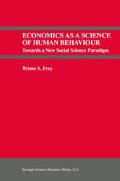Abstract
In modern economics it is a hotly debated question whether the model of homo oeconomicus is “unpsychological.” The arguments advanced to support the contrasting views differ greatly among each other, and correspondingly quite opposing conclusions are drawn.
Access this chapter
Tax calculation will be finalised at checkout
Purchases are for personal use only
Preview
Unable to display preview. Download preview PDF.
General References to the Literature
Survey books of economic psychology are Furnham, Adrian and Lewis, Alan. The Economic Mind. The Social Psychology of Economic Behaviour. Baltimore and Brighton: Wheatsheaf Books, Harvester Press, 1986.
Lea, Stephen E.G., Tarpy, Roger M. and Webley, Paul. The Individual in the Economy. A Survey of Economic Psychology. Cambridge: Cambridge University Press, 1987.
A recent article on the subject is Earl, Peter E. “Economics and Psychology: A Survey.” The Economic Journal 100, (1990): 718–755.
A corresponding collection of articles is Van Raaij, W. Fred, Van Veldhoven, Gerry M. and Wärneryd, Karl Erik (eds). Handbook of Economic Psychology. Dordrecht: Kluwer, 1988.
Areas and approaches of modern social psychology are presented in Hewstone, Miles, Stroebe, Wolfgang, Codol, Jean-Paul and Stephenson, Geoffrey M. (eds). Introduction to Social Psychology. A European Perspective. Oxford: Blackwell, 1988.
An important contribution to the development of a realistic view of man in the social sciences is due to Simon, Herbert A. Models of Man. New York: Wiley, 1957.
Economic and psychological aspects have been integrated in a particularly original way by Scitovsky, Tibor. The Joyless Economy: An Inquiry into Human Satisfaction and Consumer Dissatisfaction. Oxford: Oxford University Press, 1976.
Leibenstein, Harvey. Beyond Economic Man: A New Foundation for Microeconomics. Cambridge, Mass.: Harvard University Press, 1976.
Maital, Shlomo. Minds, Markets and Money. New York: Basic Books, 1982.
More strongly neoclassically oriented, but pursuing the same goal, are the contributions by Akerlof, George A. An Economic Theorist’s Book of Tales. Cambridge: Cambridge University Press, 1984.
Frank, Robert H. Choosing the Right Pond. Oxford: Oxford University Press, 1985
and by the same author Frank, Robert H Passion within Reason. The Strategic Role of the Emotion. New York: Norton, 1988.
Author information
Authors and Affiliations
Rights and permissions
Copyright information
© 1992 Springer Science+Business Media New York
About this chapter
Cite this chapter
Frey, B.S. (1992). Economics and Psychology: Homo Oeconomicus. In: Economics As a Science of Human Behaviour. Springer, Dordrecht. https://doi.org/10.1007/978-94-017-1374-0_2
Download citation
DOI: https://doi.org/10.1007/978-94-017-1374-0_2
Publisher Name: Springer, Dordrecht
Print ISBN: 978-94-017-1376-4
Online ISBN: 978-94-017-1374-0
eBook Packages: Springer Book Archive

